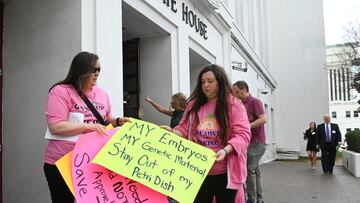IVF ruling explained: Alabama’s Supreme Court ruling and what it means
Alabama’s Supreme Court has ruled that frozen embryos are considered children, and people who destroy them can be sued under the state’s wrongful death law.

The Alabama Supreme Court recently handed out a historic ruling stating that frozen embryos used for in vitro fertilization should be considered children. The decision came as three couples filed wrongful death claims after their frozen embryos were destroyed in an accident at a fertility clinic.
A trial court had dismissed their charges, saying that in vitro embryos did not qualify as persons or children and thus, could not suffer wrongful death. The couples appealed that decision to the state Supreme Court.
The tribunal overturned the ruling, saying that unborn children are in fact children, and are therefore covered by the Wrongful Death of a Minor Act.
READ ALSO: Why can’t pregnant women get divorced in Missouri?
IVF ruling explained: Alabama’s Supreme Court ruling and what it means
The Alabama Supreme Court ruled that the Wrongful Death of a Minor law applies “to all unborn children without limitation. And that includes unborn children who are not located in utero at the time they are killed.”
This means that the court has determined in vitro embryos to be children or people. If the state considers all IVF embryos to be human beings, this can spell great liability for fertility clinics.
READ ALSO: SCOTUS steps into Trump immunity
IVF industry shaken
Critics have pointed out how the ruling could have a wide negative impact on the fertility industry. Increased liability will make IVF treatments even more expensive for those who wish to conceive a child. Medical facilities could be discouraged from carrying out fertility procedures due to fears they will be held liable whenever an embryo does not result in a successful pregnancy.
The Supreme Court decision has already had repercussions on those seeking to become pregnant. Within a week of the ruling, two Alabama fertility clinics put their IVF treatments on hold. They say they are concerned about the liability, both civil and potentially criminal, that they could face.
Another cause for concern is what to do with frozen embryos that already exist. If it would be illegal for them to be destroyed, they would then have to be preserved in perpetuity.






